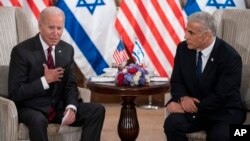U.S. President Joe Biden and Israeli acting Prime Minister Yair Lapid publicly differed on the best approach to counter the threat of Iran's nuclear weapons program, as the two leaders signed a joint declaration that reiterates the U.S. commitment to strengthen Israel's ability to defend itself and confront Iran's "aggression and destabilizing activities."
"Diplomacy will not stop them. The only thing that will stop Iran is knowing that if they continue to develop their nuclear program, the free world will use force," Lapid said Thursday in a joint press conference with Biden. "The only way to stop them is to put a credible military threat on the table."
Minutes later, President Biden reiterated the U.S. commitment to ensure Iran never obtains a nuclear weapon. But he emphasized, "I continue to believe that diplomacy is the best way to achieve this outcome."
VOA reports from Jerusalem:
Israel was a major critic of the international agreement signed in 2015 between Tehran and a group of world powers that restricted Iran's nuclear program in exchange for sanctions relief. Biden served as U.S. vice president when the agreement was signed, and it was his predecessor, President Donald Trump, who withdrew the U.S. from the deal in 2018.
The U.S. is trying to get Tehran back to the agreement, including through indirect talks in Vienna.
"There is a deal; it's on the table. And the onus now is on Iran to take that deal. And they have not proven willing to do that; they have been adding a bunch of requirements outside the boundaries of the deal," said John Kirby, National Security Council coordinator for strategic communications, in an interview with VOA.
Biden and Lapid signed a joint declaration that includes a statement that the two nations are "prepared to use all elements of its national power" to ensure Iran doesn't go nuclear.
In an interview with Israeli TV, Biden appeared to temper that by saying he would use force only as a "last resort."
Israel knows it will not secure Biden's commitment to use force on the Iran nuclear issue, said Jonathan Rynhold, head of the political studies department at Bar Ilan University.
Rynhold told VOA the American president is still seen by Israelis as "committed strategically" to the security of its Middle East allies against the Iran threat. Washington is pushing for deeper security and economic ties between Israel and its Arab neighbors, including the ongoing process of integrating the region's missile defense systems.
"It means that each of the countries will have more time to respond, which gives them more options, which helps the United States to contain conflicts because there's more time to deal with things," Rynhold noted.
In the joint declaration, Washington further affirms a commitment to work together with other partners to confront Iran's "aggression and destabilizing activities, whether advanced directly or through proxies such as Hezbollah, Hamas, and Palestinian Islamic Jihad."
Tehran maintains its nuclear program is peaceful and for energy production.
“I tell the Americans and their regional allies that the Iranian nation will not accept any crisis or insecurity in the region, and that any mistake made in this region will be met with a harsh and regrettable response,” Iranian President Ebrahim Raisi said in televised remarks aired after the U.S.-Israeli joint declaration.
Israeli regional integration
As the U.S. encourages Israel's deeper integration into the region, on Friday he will make a historic flight from Tel Aviv to Jeddah. This would be only the second time an American president has flown between the two nations, which currently don't recognize each other diplomatically, following Trump's 2017 flight from Riyadh to Tel Aviv.
Before heading to Jeddah, Biden will meet with Palestinian leader Mahmoud Abbas to reiterate support for the two-state solution, despite dim prospects.
Biden drew a direct correlation between prospects of a Saudi-Israel diplomatic normalization and a two-state solution toward an independent Palestinian statehood.
"As we work together toward greater integration – greater integration, we'll also continue to work toward a lasting negotiated peace between the state of Israel and the Palestinian people," Biden said.
"Israel must remain an independent democratic Jewish state," he said. "The best way to achieve that remains a two-state solution for two people, both of whom have deep and ancient roots in this land, living side by side in peace and security; both states fully respecting equal rights of their citizens, both people enjoying equal measures of freedom."
Palestinian activists say such words are not enough, and Biden must publicly condemn Israeli settlement expansions and the demolition of Palestinian homes.
"These are things that the administration hasn't done that would, for the Palestinians, show that the U.S. is seriously interested in the two-state solution, ensuring that the two-state solution is still on the table," said Zaha Hassan, a Ramallah-based human rights lawyer and a fellow at the Carnegie Endowment for International Peace, to VOA. "And these are the kinds of things that the Palestinians have not seen."
The Biden administration is not offering a roadmap to peace between Israelis and Palestinians, but it is renewing U.S.–Palestinian ties that were severed under Trump.
The administration is set to announce $100 million for hospitals in East Jerusalem. Other planned announcements include those focusing on Palestinian economic development, such as developing 4G wireless networks in Gaza and the West Bank.
I2U2
Also Thursday, Biden and Lapid joined a virtual summit of the I2U2 – a new partnership among the governments of India, Israel, the United Arab Emirates and the United States. The name refers to the first letters of the four countries' names.
The meeting focused on food security and efforts to boost clean energy.
The group is launching a $2 billion project addressing food security challenges with agricultural parks in India. The UAE is contributing funding to the project, Israel is providing technological help, and the U.S. private sector is participating.
Additionally, Biden met with Israeli President Isaac Herzog to discuss Israel's emerging relations with other countries in the region, including the UAE, Turkey and Jordan.
"The Middle East can grow into a meeting point for climate innovation and combined medical research, clean energy, food security, and peaceful exchange among faiths and peoples," Herzog said during a ceremony to award Biden with the Israeli Presidential Medal of Honor.
Per diplomatic custom, Biden met former Prime Minister Benjamin Netanyahu in his role as the official leader of Israel's parliamentary opposition. Unlike his meetings with Lapid and Herzog, Biden's meeting with Netanyahu was not open to the press. Netanyahu is set to run against Lapid in the country's early election in the coming months – its fifth in three years.
Biden ended his second day in Israel meeting American Jewish athletes and attending the opening ceremonies of the Maccabiah Games. The Games, first held in 1932, are an international Jewish and Israeli multi-sport event now held quadrennially in Israel.








